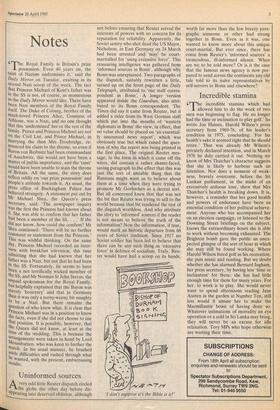Uninformed sources
very odd little Reuter dispatch circled the globe the other day before dis- aPPearing into deserved oblivion, although not before ensuring that Reuter served the interests of powers with no concern for its reputation for reliability. Apparently, the Soviet sentry who shot dead the US Major, Nicholson, in East Germany on 24 March had been arrested and 'may' be court- martialled for 'using excessive force'. This reassuring intelligence was gathered from 'informed sources in Bonn', although why Bonn was unexplained. Two paragraphs of the dispatch, suitably rewritten a little, turned up on the front page of the Daily Telegraph, attributed to 'our staff corres- pondent in Bonn'. A longer version appeared inside the Guardian, also attri- buted to its Bonn correspondent. The Times did say it came from Reuter, but it added a rider from its West German staff which put into the mouths of 'western diplomats in Bonn' the view, in effect, that no value should be placed on 'an essential- ly unsourced news report', which was obviously true but which raised the ques- tion of why the report was being printed in the first place. The original Reuter mes- sage, in the form in which it came off the wires, did contain a rather shame-faced, saving paragraph to the effect that this was just the sort of amiable thing that the Russians might want us to believe about them at a time when they were trying to promote Mr Gorbachev as a decent sort. But all concerned knew that that was not the bit that Reuter was trying to sell to the world because that bit rendered the rest of the dispatch worthless. And why attribute the story to 'informed' sources if the reader is not meant to believe the truth of the information? Now the information, if true, would mark an historic departure from 68 years of Soviet tradition. Since 1917 no Soviet soldier has been led to believe that there can be any such thing as 'excessive force' in defence of socialism. Truly, Reu- ter would have had a scoop on its hands, 'I don't suppose it's the Bible is it?' worth far more than the few breezy para- graphs someone or other had strung together in Bonn. Even as it was, one wanted to know more about this unique court-martial. But ever since, there has come from Reuter's 'informed sources' a tremendous, ill-informed silence. When are we to be told more? Or is it the case that the famous news agency is now pre- pared to send across the continents any old tale told to its naive representatives by self-servers in Bonn and elsewhere?














































 Previous page
Previous page